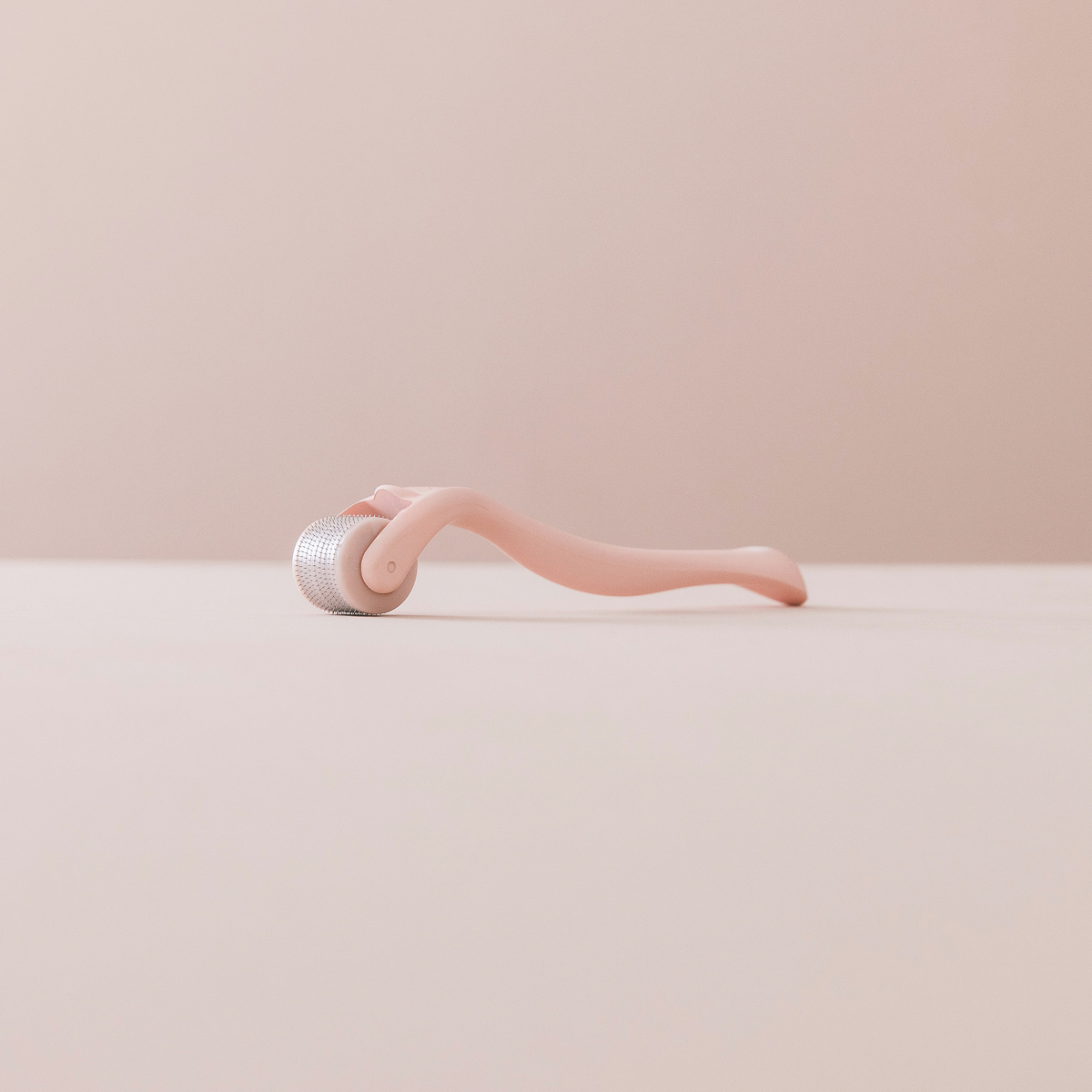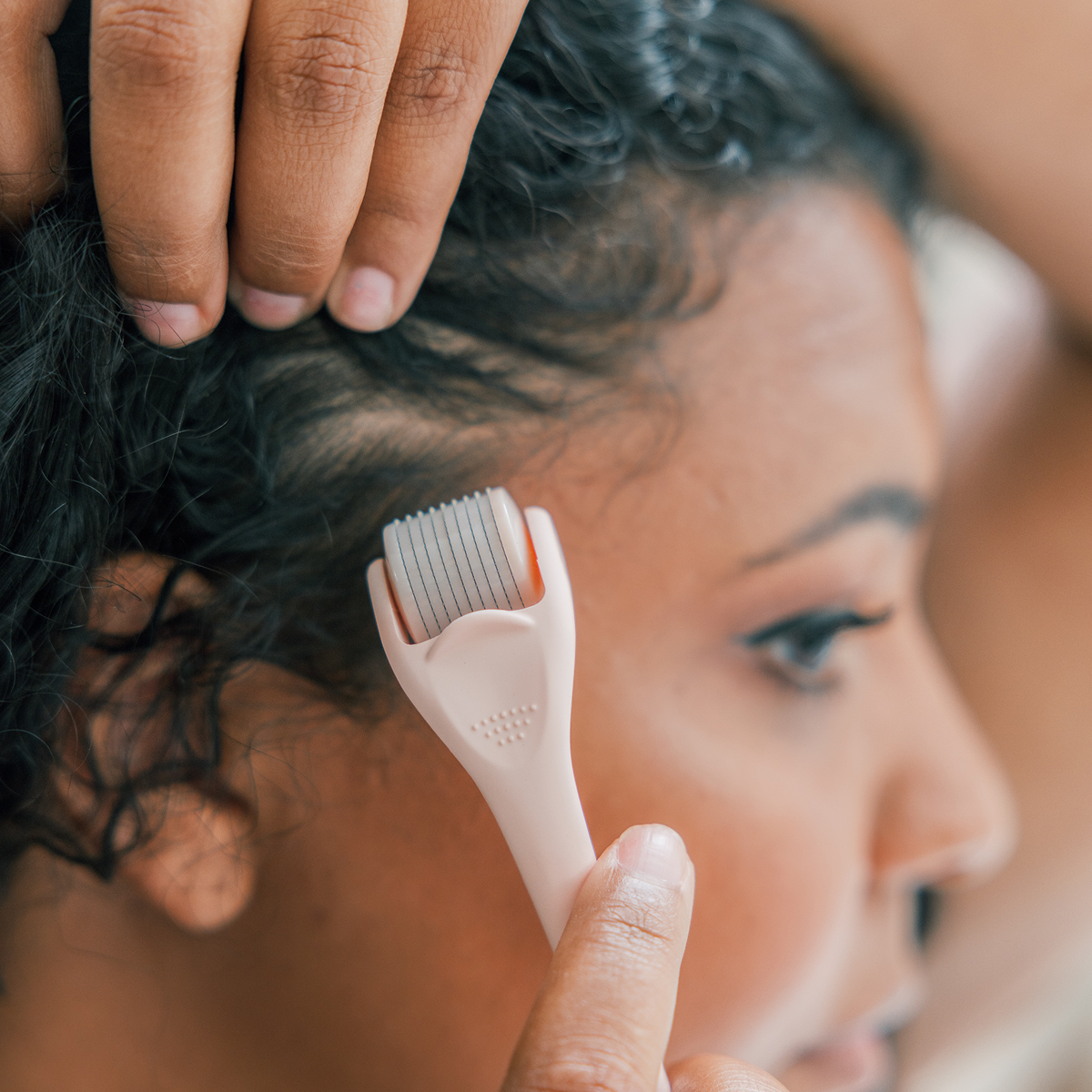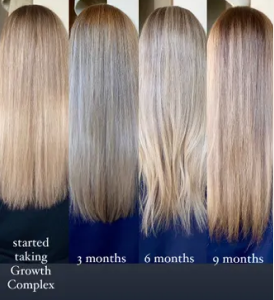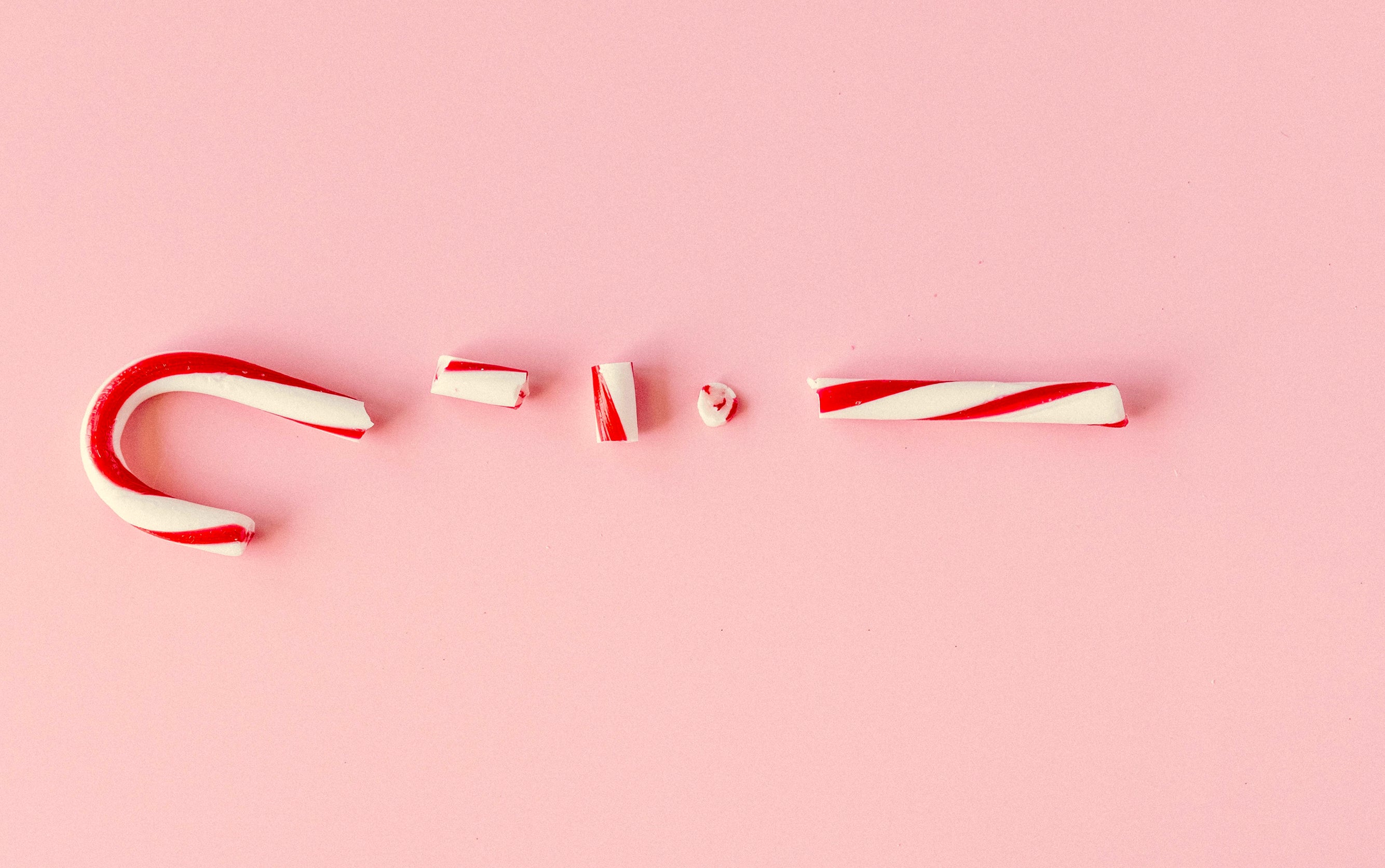“I wish my hair was like that!”
It’s something we’ve all said growing up, or even now that we’re older. Curly hair looks like so much fun when you have straight hair, and my curly-haired friends have always complained how much work their hair is. Not to mention how often as a society we dye our hair to change its look and feel.
Sometimes it’s just exciting to try out a new hairstyle or hair color. But throughout this process, we often fight hard against our own genetics.
Our genes are responsible for our hair characteristics. For example, our hair texture — if it’s curly, straight, or wavy. Or our hair color, including variations and changes. And finally it determines our hair density and thickness, and whether we have thick or thin hair or even the speed it grows.
But is it possible for genetics to influence hair loss and hair conditions? And is there any way to work around your genetics?
Do Genetics Matter for Hair?
Yes, genetics matter for your hair health. Your genes can make you predisposed to certain hair struggles, such as dry hair, oily hair, scalp conditions, slow hair growth, or thin hair. Understanding these genetic influences can help you find ways to make your hair work for you.
Here’s some common hair complaints I hear related to genetics:
- Dry hair — Genetic factors can influence the natural oil production in the scalp, known as sebum. Some individuals may have a genetic predisposition for not enough sebum production, resulting in dry and brittle hair. Also keep in mind, your environment and lifestyle may worsen dry hair. Living in a dry climate, frequent sun and wind exposure, and frequent exposure to chlorinated or salty water can dry out your hair.
- Oily hair — Just as your genetics can lead to dry hair with not enough sebum, the opposite is true for oily hair. Individuals who struggle with oily hair may have a genetic predisposition for excessive oil production. Living in a humid, hot climate can also make you more prone to oily hair.
- Scalp conditions — Certain genetic factors can contribute to the development of scalp conditions like dandruff or seborrheic dermatitis. These conditions can lead to itching, flaking, and irritation of the scalp, which is no fun for your health or feeling good about your appearance.
- Slow hair growth — Genetic factors can influence the rate of your hair growth. In an earlier blog post, I covered the hair growth cycle. As a quick recap, each hair follicle goes through four stages in this cycle: anagen (active growth), catagen (transition), telogen (resting), and exogen (shedding). If you have a genetic predisposition to slow hair growth, the anagen phase may be shorter or the transition to the catagen and telogen phases may occur more quickly. All of this could result in hair that grows at a slower rate.
- Thin hair — Along with slow hair growth, hair volume and thickness can be something you inherit. Genetic factors can influence the overall density of hair follicles on the scalp and diameter of individual hair strands, resulting in thin or thinning hair.
Is Hair Loss Genetic?
While DNA isn’t everything, your genetics do contribute to hair loss. Specific genes inherited from your parents can influence your chances of hair loss. These genes can affect your hair growth cycle, your hair follicles' sensitivity to hormones, and other biological processes related to hair.
Types of Hair Loss Related to Genetics
Alopecia Areata
Alopecia areata is an autoimmune condition where the immune system mistakes your own hair follicles as foreign and attacks them. This looks like round, smooth patches of missing hair on the scalp, face, or other parts of the body.
While there’s a lot we still don’t know about this condition, there's evidence that genetics play a role. Individuals with a family history of alopecia areata may have a higher chance of developing this condition. Most likely, multiple genes influence the immune response.
Androgenetic Alopecia (Male/Female Pattern Baldness)
Androgenetic alopecia, known as male pattern baldness in men and female pattern baldness in women, is the most common type of hair loss traced back to genetics. It follows a specific pattern — typically a receding hairline and thinning hair at the crown of the head.
What you may not know is hormones, especially androgens like testosterone, have a big role in androgenic alopecia. Testosterone transforms into DHT, thanks to an enzyme named 5-alpha reductase. For anyone with a family history of androgenic alopecia, certain parts of the scalp have hair follicles that are overly sensitive to DHT. When DHT connects with these follicles, it starts a process where they shrink, making hair thinner and shorter. And if this keeps happening, it can lead to losing hair in those spots.
You may be wondering...can men take HAIRLOVE for male pattern baldness? The answer is yes, absolutely - especially with our Growth Complex for Men!
Other Hereditary Conditions and Hair Loss
Several other hereditary conditions can trigger hair loss. For example, certain medical conditions, hormonal imbalances, and genetic disorders can cause hair loss as a secondary symptom. These conditions can affect hair growth and maintenance, and may lead to various types and patterns of hair loss.
How Your Environment Influences Your Genes and Healthy Hair
Epigenetics is a big topic right now in the natural health world. Epigenetics is how certain genes can be turned on or off without changing DNA. It's like the conductor of an orchestra, determining which genes play their notes at what time and intensity.
This means epigenetics can work for you or against you. Certain factors — including environmental influences, lifestyle choices, and experiences throughout your life — can take predispositions and make them worse. So if you already have genetics for dry hair, and then you introduce your body to the wrong environment, it can exacerbate or trigger conditions.
But, don’t worry — epigenetics can also work in your favor! If you understand how the environment can influence DNA, you can take steps to create the best environment for your hair.
What Environmental Factors Impact Hair?
Environmental factors can significantly influence gene expression related to hair traits, including hair loss. These include:
- Household products — Certain hair care products may contain harsh chemicals (sulfates, parabens, etc.) that can damage hair. Take a closer look at your shampoos, conditioners, and styling agents. Prolonged use of products with these chemicals may modify gene expression for hair quality and growth.
- Pollutants — Exposure to environmental pollutants, such as airborne toxins and chemicals, can hurt hair health by again altering gene expression related to hair growth and quality. This includes heavy metals, industrial fumes, pesticides, radiation, and volatile organic compounds (VOCs).
- Sun exposure — Overexposure to the sun's UV rays can lead to damage and dryness of the hair. It can also impact your hair’s gene expression, potentially contributing to hair problems or conditions.
- Water quality — Water with high mineral content, known as hard water, can impact the texture and manageability of hair. The minerals can build up on hair, making it feel rough and difficult to style. Many municipal water supplies are also treated with chlorine, which is an effective disinfectant but is harsh on hair. Chlorine strips away natural oils, which makes it hard to retain moisture and keep a balanced pH.
What Lifestyle Factors Impact Hair?
- Diet and nutrition — Nutritional habits and diet play a significant role in hair health. Poor nutrition can negatively influence gene expression for hair traits, while a balanced diet rich in essential vitamins, minerals, and proteins supports healthy hair growth.
- Hairstyling methods — Hairstyling methods and practices can damage your hair. If you’re already prone to breakage or sensitive follicles, it can make a bad thing worse. Be careful of tight hairstyles, overusing heated styling tools, frequent hair coloring, etc.
- Poor sleep — Lack of sleep or disrupted sleep patterns can affect overall health, including your DNA’s ability to repair and your hair. Quality sleep is essential for hair growth and repair.
- Smoking — Smoking is a harmful lifestyle habit for many reasons, and one big one is your hair. The chemicals in tobacco and the overall impact on the body can affect gene expression for your hair quality and growth.
- Stress and mental health — Chronic stress and high levels of anxiety can alter hormonal balances and trigger changes in gene expression related to hair loss. Stress management techniques and self-care can help calm your body and bring it back to balance.
Tips to Manage Genetics for Healthy Hair
It’s true — we cannot change our DNA. But that doesn’t mean you’re a lost cause! Understanding your genetic predispositions can help you be mindful and choose the best hair care routines for your unique hair. Here’s my top tips to help your hair out:
- Tailored hair care routine — Individuals with a genetic predisposition for oily hair may benefit from something called hair training so you can teach your scalp and hair to find its natural balance. Those with dry hair should focus on hydrating and moisturizing their hair to maintain its health and shine. Our Nourish+Repair Serum, made of 100% organic argan oil, can help prevent dryness, reduce breakage, and promote balanced pH. You may also want to give at-home hair masks a try.

- Natural hair growth support — If you’re struggling with thinning hair, hair loss, or hair damage, our Growth Complex is what I recommend. It’s specially formulated to deliver the vitamins and minerals you need to promote hair growth and hair health. While it cannot reverse genetics, it can give your hair the nutrients it needs so it’s in a much better place.
- Give your scalp some TLC — If you’re struggling with scalp conditions and an itchy, dry scalp, it may be time for a scalp detox. Just as your body needs to get rid of gunk and build-up, so does your scalp! Both exfoliation and massage can help. Our Deep Conditioning & Scalp Treatment Bundle includes our Detox Scalp Massager and Nourish+Repair Serum to give your scalp special, targeted care.
- Healthy diet and lifestyle choices — I listed a ton of lifestyle factors above that can influence your hair genetics. First off, a balanced diet is so important for your hair. Managing stress and avoiding harmful habits like smoking can also be a positive for your hair despite genetics.
Catch more beauty sleep — Sleep has so many benefits for you, and yes, one of those is your hair! While you sleep, your body is hard at work repairing and rejuvenating itself. Getting deeper and longer sleep can help out your DNA repair process, plus your hair repair and growth. Check out our Beauty Sleep + Beauty Pillowcase Bundle if you’d like some help catching more Zzs!




























